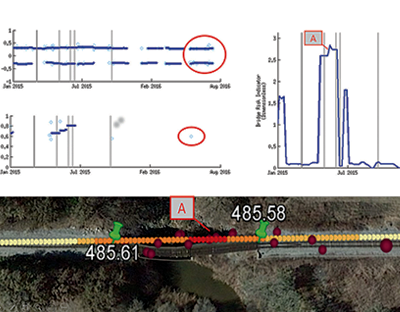Data Analytics
ENSCO employs subject matter expert-driven data analysis of track measurement, instrumentation, simulation, and economic analysis data. ENSCO uses small and large data analytics tools and methodologies, including statistical, artificial intelligence and machine learning.
Benefits of ENSCO Data Analytics
- Root Cause Identification
- Prediction
- Optimization
Case Study: Data Analytics
![]()
Project: Ballast Fouling and Trending Study
The Challenge: Determine criteria for class-based approach to fouled ballast safety enforcement.
The ENSCO Approach: Collect and analyze pertinent information via track inspection vehicles, long-term wayside instrumentation and ground-penetrating radar.
Result: Objective criteria for more consistent enforcement of fouled ballast safety.
Case Study: Data Analytics
 Project: Track Feature Risk Assessment Using V/TI Data
Project: Track Feature Risk Assessment Using V/TI Data
The Challenge: Assess track feature health/risk using Vehicle/Track Interaction monitors and determine if the approach can scale to fleet size and offers greater coverage than traditional systems.
The ENSCO Approach: Use analytical models that can be trained and applied to a variety of track features to develop a risk assessment index algorithm to rank features and conditions, and identify/prioritize high-risk sites.
Result: Track feature-specific Bridge Risk Index that provided health and derailment risk assessments for bridges to prioritize maintenance.